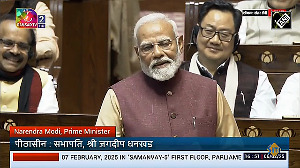Cuddalore is located 175 km south of the state capital Chennai and 22 km south of Pondicherry. This is home to Silver Beach, which saw great devastation in the tsunami waves. The beach is still off-bounds, with the police deployed to prevent visitors like me.
To the left is Thevanampattinam village, which has since been adopted by Vivek Oberoi and his family, but more about it in a while.
Relief work is being carried out here on two fronts. One is courtesy the revenue department that is distributing government aid -- Rs 4000 in cash, 60 kg rice, clothes and three litres of kerosene to the survivors.
The other is the District Rural Development Agency, which receives the aid that is pouring in from all over the country and distributes it to the families in distress.
Also see: 'Now there's a bigger flood of aid'
A van full of mattresses and brooms comes into the DRDA compound when I am there, and the volunteers want to take it away for immediate distribution. The officer in charge tells them to first take it to the godown, have the consignment entered in the register, accounted for and then distributed. The donors next want a photo of them handing over the aid, and he obliges.
The assistant divisional engineer of DRDA, Cuddalore, is the man in charge, and he tells us that there have been a mind-numbing number of deaths here. The number of homes destroyed is close to 5,000 and the number of boats damaged is yet to be ascertained. Yes, the inflow of aid was huge, both from NGOs and individuals, in the form of rice, clothes, blankets, bed sheets, sugar, milk powder, baby food, water bottles and packets, stoves and utensils.
Project Hope is the other provider of relief in the village, the brainchild of Bollywood actor Vivek Oberoi who is coordinating with the district collector and doing his bit here. His father Suresh Oberoi is also here, and the family has adopted this village and is trying to help the fishermen get back on their feet. So far, they have built over 170 temporary shelters made of bamboo and thatched leaves. They are planning to build 300 more and work is going on at a furious pace. Water and power supply has already been restored, and some 2000 villagers are being fed at seven sites. Ashok Garg, a friend of the Oberois from Pondicherry, has sent two of his employees to help out.
The actor himself is not here, having gone back to Mumbai; nor is his father here, having gone to Pondicherry on some work. The person in charge in their absence is a swamiji, presumably from the Oberois' spiritual guru Swami Chidanand Saraswati Maharaj's order.
Nearby are three army men from the Madras Regiment but who seem to have no clue why they are here. The police, on the other hand, seem better organised, helping those who were looking for missing family members and doing other things. Like putting up photos of those who had been buried without being identified.
Nearby is a government medical van tending to the sick and injured. How well they do their job was evident when a young woman came to them with a suppurating wound on her leg. The contrast could not have been more stark. Here was the nurse in starched white, with not a spot of dirt on her, making one wonder how she stayed so clean in a disaster area. Next to her was this victim who looked every bit one. The nurse looked at the wound as one would look at a mangy dog, gave the woman some ointment and cotton, and asked her to clean the wound and apply the ointment. I could not take it beyond this, and objected. 'That wound is full of puss, the leg will get infected, why don't you give her an anti-tetanus injection?' I got a look that could kill but at least the nurse asked the peon to get a tetanus shot. Hearing the commotion, Dr Ashok, who was in the front of the ambulance, called the patient to him and examined her. On being told she was still breastfeeding, he said anti-tetanus was not good for lactating mothers and suggested another antibiotic.
The doctor told us they were ensuring there was no epidemic of malaria or diarrhoea in the region. The locals had already been vaccinated against cholera, water was being chlorinated and bleaching powder, a common disinfectant, had been sprinkled all over the place.
Cuddalore is one of the places which bore the brunt of the tragedy, but it is clear the people have risen to the need of the hour. And yes, so has the rest of the country.
-
Next: The scene in Karaikal
Tsunami strikes: The complete coverage
(A Ganesh Nadar has been travelling northwards from Kanyakumari to Cuddalore in the tsunami-hit areas of the Tamil Nadu coast)






 © 2025
© 2025